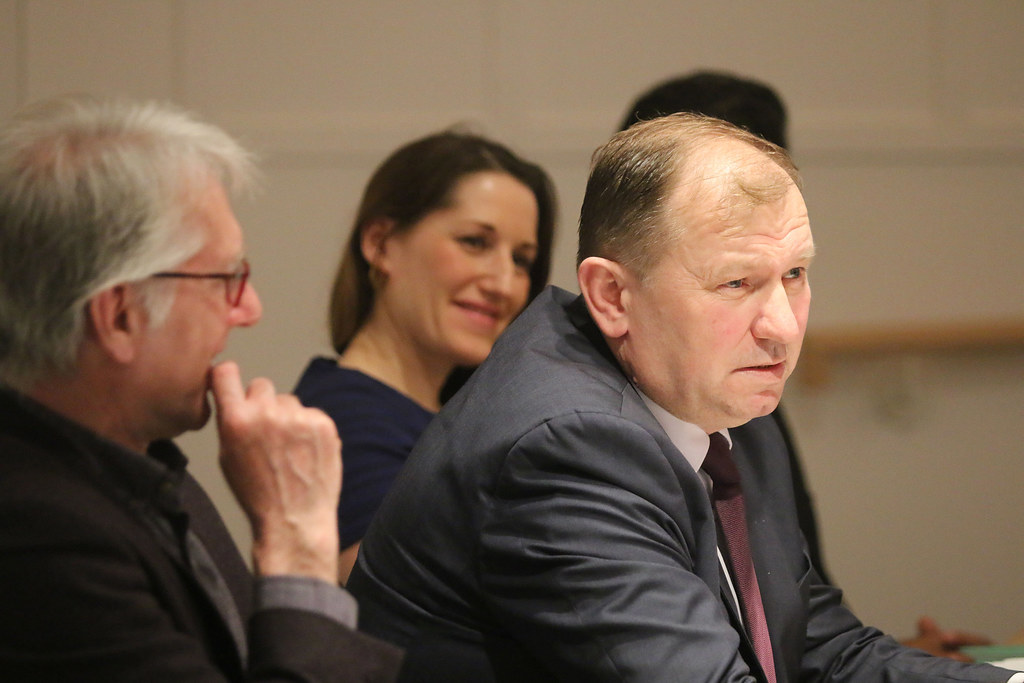In his latest report to the United Nations (UN), child psychiatrist Dainius Pūras advocates for a transformation in the way we collectively understand and intervene on mental health issues.
Pūras, serving as the UN Special Rapporteur on the rights to physical and mental health, argues that the dominant biomedical view of ‘mental illness’ has led the psychiatric and psychological fields to focus on institutionalization and biological interventions (e.g., psychotropic medications) at the expense of human rights and social change.
While the scientific exploration of the biological bases of particular symptoms is important for informing a complex understanding of ‘mental disorders,’ Pūras suggests that we shift our attention to the social determinants of health and prioritize human rights—which have been neglected by the current psychiatric framework. He writes:
“Those obstacles, power asymmetries in mental health care, the dominance of the biomedical model, and the biased use of knowledge, need to be addressed by changes in laws, policies, and practices,” Pūras writes. “In particular, the dominance of medicalization in both existing and even in some ‘progressive’ policy reforms continues to mask broader social injustices that must be confronted and addressed by the global community… Scaling up rights-based support within and outside existing mental health systems holds much promise for the changes that are needed.”

The Special Rapporteur’s report on the right of everyone to the enjoyment of the highest attainable standard of physical and mental health was divided into four sections: (1) Global mental health, (2) over-medicalization and threats to human rights, (3) Rights-based approaches to alternatives, and (4) Global threats and future trends.
Global Mental Health. As the UN serves global interests, it shares the goals of the Movement for Global Mental Health (MGMH) of increasing access to services and improving mental health and wellbeing across the world. However, Pūras’ report advocates shifting the framework of the MGMH towards a contextualized approach to mental health (as suggested by practitioners in the Global South) that takes social, political, economic, and cultural differences between countries into account.
Pūras discusses how colonial psychiatric systems were established in some countries, but the ways in which psychiatry is practiced and institutionalized is particular to each nation and locality. Further, each country faces distinct social and political determinants that can harm mental health. According to the Special Rapporteur:
“Those harms can arise from systemic violations of economic and social rights, such as neoliberal policies and austerity measures. Harms to mental health can equally arise from systemic violations of civil and political rights that lead to structural discrimination and violence against different communities, as well as restricting the space of civil society.”
Pūras suggests that high-income or low-income countries alike, in the Global North or South, immediately take steps to transition away from a reductionistic biomedical approach to understanding and treating mental health issues. To adequately address psychological distress, countries’ mental health policies must engage with transformative human rights actions, take a diversity of experiences into account, and implement social integration, connection, and participation that lead to transformation and empowerment. This shift includes a change from standardized forms of practice to locally adapted and culturally attuned practices.
Overmedicalization and threats to human rights. Pūras also addresses how current systems that individualize psychological distress (situating responsibility for mental distress within individuals) have led to a “mad or bad” approach. The “mad or bad” approach criminalizes people who experience psychological distress or labels them as “sick, mad, or patients.”
Criminalizing psychological distress has led to mass incarceration, while medicalization has taken the focus off of social inequities and led to the widespread promotion of psychiatric drugs by pharmaceutical companies. Pūras argues that it is necessary to decriminalize mental health problems (such as addiction, for example) and institutionalize psychiatry, in order to protect and promote human rights. Moreover, overmedicalization also stands in the way of a rights-based approach to mental health since, according to the Special Rapporteur, it “…can mask the ability to locate one’s self and experiences within a social context, fueling misrecognition of legitimate sources of distress (health determinants, collective trauma) and producing alienation.”
“In practice, when experiences and problems are seen as medical rather than social, political or existential, responses are centered around individual-level interventions that aim to return an individual to a level of functioning within a social system rather than addressing the legacies of suffering and the change required to counter that suffering at the social level. Moreover, medicalization risks legitimizing coercive practices that violate human rights and may further entrench discrimination against groups already in a marginalized situation throughout their lifetimes and across generations.”
Social determinants and rights-based approaches to mental health challenge these individualizing notions and highlight how a reductive biomedical understanding of mental health is challenged by scientific evidence and leads to obsolete treatments that are often ineffective.
Rights-based approaches and alternatives. Alternatives to biomedical approaches to mental healthcare have existed alongside conventional treatments for decades. These have changed lives and communities without resorting to coercion or other forms of violence while addressing the needs of people and groups.
Rights-based alternatives can take different forms. Some have worked to better the quality of mental healthcare services, changing institutions through systems-level reforms, localized innovations, peer-respite centers, recovery communities, medication-free wards, and developing communities and groups. Worldwide, these options have shown a “deep commitment to human rights, dignity, and non-coercive practices, all of which remain an elusive challenge in traditional mental health systems too heavily reliant on a biomedical paradigm,” says Pūras.
Rights-based alternatives are characterized by key principles: dignity and autonomy, social inclusion, participation, equality and non-discrimination, diversity of care, and addressing underlying social and psychosocial determinants of health.
Global threats and future trends. The Rapporteur identifies several threats to global mental health and wellbeing: climate change, digital surveillance, and COVID-19.
Climate change has worsened global social inequalities and is also exacerbated by the systems that keep these inequalities in place. The effects of climate change also pose a threat to the right to health, as it affects clean air, drinking water, adequate housing, food, economic security, social relationships, and community life.
Heatwaves also disproportionately kill those who are institutionalized and who are in the margins. Confronted with ecological destruction, people experience emotional and existential distress that, at times, leads to hopelessness. Some research suggests that this may be especially true for younger generations who are likely to bear the brunt of these effects.
Corporate- and State-owned digital surveillance databases (street cameras and facial recognition, data from government, banks, stores, internet searches, and social media) are being used for social categorization, criminalization, and commercial purposes. These data are often used without an individual’s permission or consent and are prone to errors that can lead to misinformation, misidentification, and misrecognition. Psychologically, this technology makes people fear social participation, which has an impact on their mental health and wellbeing.
Referencing COVID-19, Pūras acknowledged that the effects of the pandemic and the public health measures are still to be determined. However, he mentioned that “important challenges and opportunities related to mental health are expected, and these should be taken into account now.”
For decades, psychiatric and psychological knowledge, practices, and services have utilized a reductive biomedical model that has individualized suffering and psychological distress while ignoring the social and psychosocial determinants of health. These approaches have not only failed to address mental distress worldwide, but they have turned our collective attention away for the social factors that contribute to suffering.
Pūras’ suggestion of shifting to a rights-based approach to mental healthcare aims to provide solutions to mental health crises and distress that do not involve coercion or other human rights violation while also attending to the sociopolitical and economic factors that lead to distress.
****
United Nations General Assembly (2020). Right of everyone to the enjoyment of the highest attainable standard of physical and mental health: Report of the Special Rapporteur on the right of everyone to the enjoyment of the highest attainable standard of physical and mental health. Retrieved from: https://undocs.org/A/HRC/44/48















Thank you Jose.
“and the biased use of knowledge, need to be addressed by changes in laws, policies, and practices,”
It is not “biased use of knowledge”. It is pretending to “have knowledge” when there is none and THAT IS EXACTLY the problem. Exactly why anyone would have to ask for what is theirs to begin with. It needs to be exposed for it’s lies, it does not need to ask for “human rights”. The fact that we are asking, is disgusting.
Report comment
Thank you, Sam. I am so grateful to hear your wisdom. Finally, a real conversation!
Report comment
First off The Special Rapporteur shouldn’t be a psychiatrist, psychiatry should be abolished and outlawed for major crimes against humanity. It’s only going to get worse and unless the wider population realise that – from the perspective of eugenic psychiatry which is what we have – they are doing very well indeed, no one is going to stop them: no government, no regulation, no body that is suppose to protect victims of this closed culture of abuse, no UN, no law, no council, no advocate. We need a massive and sustained public outcry. Psychiatry will continue to lie – what else can it do – and pump neurotoxic drugs into people inducing torture akathisia, mania, violence, suicide, homicide, blame the victims and anything but their own actions. It’s up to us to educate the general public.
Report comment
“It’s up to us to educate the general public”.
Couldn’t agree more, Streetphotobeing.
And it’s true, they can’t do anything else at this point. They can’t get out.
Report comment
100% accurate, and my lived truth: I have been poisoned, for 19 years, by my parents, and their expensive doctors — where abusers hid behind a diagnosis put on me, to maintain their fame and lifestyle of zero ethics and full surrender, trusting in Psychiatry. Pure evil has a name: Psychiatry.
Pure Love also has a name, and the doctor I trusted with my life, saved me in 2004, Dr. Hyla Cass, and since 2019, Dr. Kelly Brogan, and her Vital Mind Reset, Vital Life Project, 2 online supportive, real communities.
These women have taken great strength and courage to stand for truth, health sovereignty
and reality. The only reality is ever-expanding good. All else is steeped in lies, genocidal-tendendencies, and this holocaust on Nature, mask included.
Aloha, Mahalo for being here, Claire, I am free,
shining, always.
Report comment
Yes. Psyche needs polytheistic background, its proper rhetoric, because there is no possibility to talk about polytheistic psyche using monotheistic rhetoric – monotheistic religion and science based on monotheistic theology. How can you talk about something which is beyond your small perception? Mono-theism is less than poly-theism.
James Hillman “Re -visioning psychology”.
We need to reanimate psyche. Because monotheistic man has gone to far with barbarism.
Report comment
It sounds all fine, well, and good. But until the DSM is flushed, and forced treatment is outlawed. It will not be possible to have a human rights-based approach to mental health care.
Psychiatrists cannot mutually have both the right to take away others’ rights, and claim to have a rights-based approach to mental health care. That’s complete hypocrisy. Forced treatment needs to be abolished, for a rights-based approach to actually come to fruition.
The DSM billing code “bible” is the source of the stigmatizations used in the reductionist biomedical model. It is an over medicalization of most forms of human distress and emotions, despite the fact that distress and human emotions are not diseases. And the two “most serious” DSM disorders, “bipolar” and “schizophrenia,” are iatrogenic illnesses, that can be created with the psychiatric drugs. It is well known now that the DSM is scientifically “invalid.” Use of the DSM and coordinating ICD “disorders”/stigmatizations needs to end, for a rights-based approach to mental health care to actually come into fruition.
Without those two changes, changes which would shock and leave somewhat disoriented initially, the “mental health” workers. But this would force the “mental health” workers to start to self examine, and hopefully start to garner insight into the systemic crimes against humanity, to which they’ve been participating.
https://www.nimh.nih.gov/about/directors/thomas-insel/blog/2015/mortality-and-mental-disorders.shtml
And the “mental health” system will never choose to give up its undeserved right to take away others’ rights, defame people with their “invalid” stigmatizations, and neurotoxic poison others. Those undeserved rights need to be taken away from the “mental health” system by a more powerful institution than psychiatry, like the UN and/or our governments, or by a public outcry by a properly educated public. But those of us speaking the truth are being censored.
And in the meantime, the psychiatrists should be put to work, weaning all those they’ve defamed and neurotoxic poisoned, off the psychiatric drugs. Actually, most the psychiatrists deserve to be arrested, but cleaning up the mess they’ve created is probably the wiser move.
I’d love to see a rights-based approach to mental health, but without those two changes, it will never come to fruition.
Report comment
Agreed!
Report comment
“. . .We need a massive and sustained public outcry. Psychiatry will continue to lie – what else can it do . . . It’s up to us to educate the general public.”
How do we do that better? Not just psychiatry though — talk therapy and the “relationships” there can be damaging and harmful, too, in ways that people looking for “help” can never imagine and often can’t see when it is happening.
Report comment
This version of the report has been out since April. I think it has been reported on before. This particular article seems a little disjointed, but the source report is a bit long, covers many subjects, and focuses on existing systems that are already in place, not on any vision for something better.
This man, Pūras, cares about human rights, but is also an academic psychiatrist and doctor. So you can expect that he will “mind his manners” when speaking about the topic. The report does not focus on theory, either – only policy. Though he warns about the failures of the biomedical model (a model of treatment, not really a theory of causation) to protect patient rights, he does not condemn it as totally false or unworkable.
What I have been looking into mostly during the past week is our larger sociopolitical environment, where it came from and what it is being used to accomplish. And the conclusions I am finding are alarming.
Long ago there was a conviction, even among scientists, that the psyche was real and that notions of the spiritual had some basis for validity, as well as a degree of utility in society. Around the time of The Enlightenment, that view started to change. In Europe, the church had become entrenched, and was standing in the way of intellectual (and technology?) progress. Thus, the Enlightenment sought to shift the focus of scientific thinking away from the spirit (psyche) and towards the physical, but with a strong push for “human rights” centered around the right to speak freely about ideas that threatened the status quo.
However, the focus of scientific thought on the physical led to various dehumanizing philosophies and practices, requiring that the demand for basic human rights be continuously re-asserted, but with less and less effectiveness. Today we live in a world where “science” is the new status quo – the new religion – and where behavior or ideas that oppose the “findings of science” can be labelled mad, delusional, or socially dangerous.
Today I can get on Facebook and suggest that this whole mask thing might be overblown and get accused of being a criminal. The right to one’s own ideas has been lost, buried under a new hubris of social safety and “justice.”
No one wants to talk about the importance of basic human rights. So I’m glad this is still considered a valid issue at places like Mad in America! Most people want to talk about what the “science says.” For so many now, the future looks like a “brave new world” that hearkens back to the disturbing ideologies of Technocracy and scientism (that in their time also embraced the “science” of Eugenics) where all moral values are forsaken in the name of scientific “truth.”
The ironic thing about all this is that science is now in the process of validating the existence of the spirit (or some similar causal agency) that will eventually have to be incorporated into our understanding of the physical world for any further progress in the sciences to be made. We need to stay true to our conviction that human rights are important, if not totally basic, to human life. I am sure that the very foundations that support our understanding of why human rights are so important will be attacked in the weeks, months and years to come. We must not let those attacks be successful.
Report comment
Thank you to all who care about reality. May the truth prevail as it always does, eventually. How can we help this spiral of evolution along, and end the iatrogenic criminal harms done by doctors? Please celebrate those lighting up a holistic way forward and real healing, being renewed, released from toxic meds cycles, and regenerating….made whole.
Report comment
L.
Good post.
The good thing is, we only have 100 years. So each shrink gets a measly 40 years to exert his sheit. Woohoo and then he gets old and is done. And a tombstone or urn stands for a few that admire and think of him. And it’s NOT his clients, not the ones he injected. Not the ones he fed bullshit and chemicals to. Not the ones he glared at with his biased upbringing.
Report comment